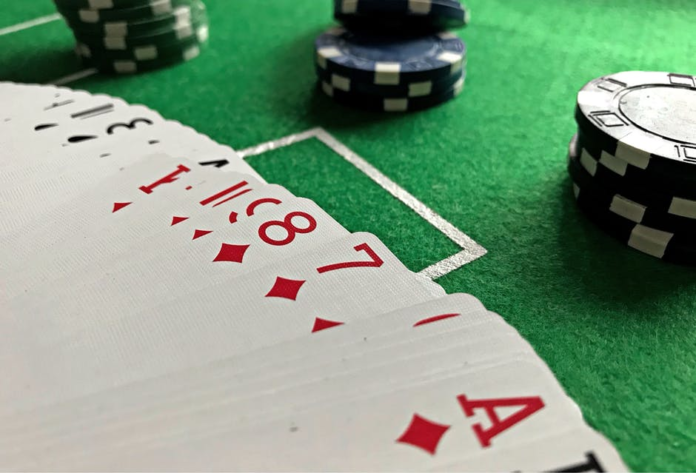Poker is one of the most popular card games in the world. Since its creation, it has captured the attention of many people worldwide. Unlike many other card games, this is a game that combines skill, strategy, and luck to create an exciting experience for players.
Poker hands are played with a standard deck of 52 cards. The game’s main objective is to conquer the pot, which is the amount of all the bets made by the players in hand. Each player must make the best five-card hand available, using any combination of their two cards and the five cards dealt face-up on the table.
Nowadays, online poker is available through gambling internet sites. Consequently, many people are drawn to learning the game to access hours of online entertainment.
Below, we will go through poker hands basics to help you get an insight into this fantastic game that has already captured enthusiasts worldwide.
The history behind the game

Poker has a long and captivating history dating back to the early 19th century. The exact origins of the game are undefined, but many believe it derives from European card games such as Poque and Primero.
During the 19th century, the game spread quickly in the USA, mainly during the Civil War, when soldiers are believed to play the game.
The game that we currently call poker began to take shape in the early 20th century with the insertion of community card games. These games consisted in using a combination of personal cards and community cards to make the best possible hand.
Over time, it has progressed and changed according to the current times. A significant milestone in poker was the introduction of online poker, which made this fantastic game available to a broader public.
Nowadays, poker is still a viral game played by millions of people worldwide, both in virtual casinos and land-based ones. It is a game of skill, strategy, and luck that has fascinated players for centuries, and it is still one of the favorites cards games in the world.
Poker rules

One of the motives why poker has become so popular over the years is because of the intellectual challenge it poses to players. Players must be able to interpret their opponents, recognize the odds of a game, and make fast and precise decisions under high pressure. Let’s start understanding what poker is about to allow you to enjoy this fantastic game.
Poker has many variations, including Seven-Card Stud, Omaha, and Five-Card Draw. Each variation has its own set of rules, but the most traditional poker version is played with a standard deck of 52 cards, and the objective is to win the pot.
Each player must place a bet on a percentage of the pot when the game starts. The game then continues, with each player receiving two cards face down. After that, the first betting round opens with the player to the dealer’s left.
Once the betting round is finished, three cards are dealt face-up. Another round of betting follows, and then the fourth card is dealt. Another round of betting happens before the final card is dealt. After that, the final round of betting occurs, and if two or more players remain, a showdown occurs. The player with the best five-card hand using their two-hole cards and the five cards gets the pot.
As it can be proven, rules are pretty simple, and once players recognize the movement of the game, it can be a pleasant and gratifying experience. However, becoming skilled at the game can take years of practice and experience.
Strategies for Winning

Winning at poker is a skill that comes with practice and knowledge. By studying the rules and becoming familiar with all of the various strategies, you can increase your chances of winning every time you play.
Choose Your Game Wisely
Making wise decisions from the start is key to success in poker. When choosing which game to play, it’s important to select one that fits your level of experience and financial means. Playing with real money should be approached seriously and players should understand the risks before playing.
At the same time, if you are a beginner, it may be best to play free or micro-stakes games until you have honed your skills enough to move up in stakes. Look for games with a low rake (the house fee) as this will help reduce losses over time and give you more money to play with eventually.
Study Harder Than You Play
No matter what type of poker you choose to play, studying the game is key to becoming successful. It’s important to understand both strategy and math fundamentals before leaping into action at a table full of experienced players. Studying books on poker theory as well as watching professional tournaments will help build up your knowledge base so that you make smarter decisions when playing for real money down the road.
There are also helpful tools available online that allow players to track their results and study opponents’ histories – these can prove invaluable in developing overall strategy when playing against others.
Set A Budget And Stick To It

It’s essential that poker players set limits on how much they are willing to spend during any session – whether they are playing live or online – before they begin playing. Sticking firmly within those limits will help prevent huge losses while still allowing room for some risk-taking every now and then when needed; having an established budget will also remove any surprises afterward!
Remain Positive & Adaptable
When things go south during a session – which inevitably happens even for skilled players – stay positive by reminding yourself why it was worth playing despite losing some hands here or there; above all else remember: If you don’t like how things are going right now just wait – because they’ll certainly change soon enough!
In conclusion, playing poker online can be an entertaining experience. One of the main advantages of playing online is that it is convenient since players can access the games from anywhere and at any time. To make the most of playing online poker, keeping a responsible attitude towards gambling and setting limits on time and money spent is vital.







